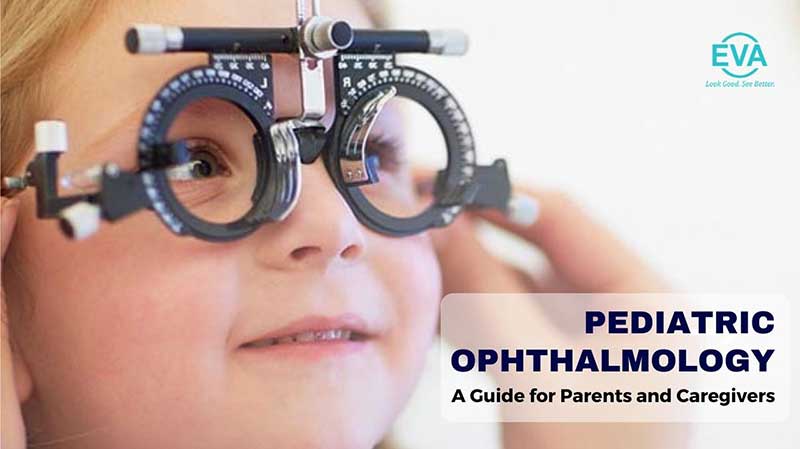Everything You Need to Know About Pediatric Ophthalmology

When it comes to caring for our children, their health and well-being are paramount. One often-overlooked aspect of their overall health is their vision. Pediatric ophthalmology is a specialized branch of medicine that focuses on diagnosing and treating eye problems in children. In this blog, we'll explore everything you need to know about pediatric ophthalmology, from common eye conditions to the importance of early intervention.
Understanding Pediatric Ophthalmology
Pediatric ophthalmologists are eye doctors who have completed additional training to diagnose and treat eye problems specific to children. They are experts in managing a wide range of eye conditions, from simple refractive errors to complex surgeries. The unique challenges and characteristics of treating children's eye issues make this field distinct from adult ophthalmology.
Common Pediatric Eye Conditions
Here are some common pediatric eye conditions:
- Refractive Errors: Refractive errors like myopia (nearsightedness), hyperopia (farsightedness), and astigmatism are common in children. They can affect a child's ability to see clearly and may lead to other issues if left uncorrected. Pediatric ophthalmologists can prescribe glasses or contact lenses to correct these errors.
- Strabismus: Strabismus, or misalignment of the eyes, is another common issue in children. One eye may turn in, out, up, or down, causing double vision or amblyopia (lazy eye). Early intervention is essential to prevent long-term vision problems, and treatment may include eye patches, eye exercises, or surgery.
- Amblyopia: Amblyopia is reduced vision in one or both eyes, often referred to as "lazy eye." It can result from uncorrected refractive errors or strabismus and needs prompt attention to restore normal vision. Treatment may involve patching the stronger eye to stimulate the weaker one.
- Congenital Cataracts: Some children are born with cataracts, which cloud the eye's natural lens. Pediatric ophthalmologists can perform surgery to remove the cataract and replace the lens, restoring clear vision.
- Retinopathy of Prematurity (ROP): ROP is a potentially blinding eye disorder that primarily affects premature infants. It occurs when abnormal blood vessels grow in the retina. Pediatric ophthalmologists closely monitor premature infants and, if necessary, provide laser therapy to prevent vision loss.
- Ptosis: Ptosis is drooping of the upper eyelid, which can obstruct a child's vision. Surgical correction is often required to improve both the appearance and function of the eyelid.
- Blocked Tear Ducts: Blocked tear ducts can lead to watery eyes and infections. A pediatric ophthalmologist can perform a simple procedure to open the blocked duct and prevent further complications.
- Nystagmus: Nystagmus is an involuntary, rhythmic movement of the eyes. While it cannot be cured, pediatric ophthalmologists can help manage it to improve visual function and quality of life.
Importance of Early Detection and Treatment
Early detection and treatment of pediatric eye conditions are crucial for several reasons:
- Developmental Impact: Children's visual development occurs rapidly during their early years. Undiagnosed or untreated eye issues can hinder their ability to learn and interact with their surroundings.
- Amblyopia Prevention: Amblyopia can be effectively treated if detected early, typically before the age of 7. Delayed treatment may result in permanent vision loss.
- Quality of Life: Correcting vision problems at a young age improves a child's quality of life, allowing them to participate fully in educational and social activities.
- Safety: Some eye conditions, such as strabismus, can impact depth perception and coordination. Early intervention ensures children's safety, especially in activities like sports.
- Emotional Well-being: Children with untreated eye problems may experience emotional and psychological challenges, such as low self-esteem and social isolation. Timely treatment can prevent these issues.
When to Schedule an Eye Exam for Your Child
Regular eye exams are essential for monitoring your child's eye health. Here are some general guidelines:
- Infants: Schedule the first eye exam at around six months of age to ensure the eyes are developing correctly.
- Preschoolers: By the age of three, your child should have another eye exam to check for refractive errors, strabismus, and amblyopia.
- School-age Children: After starting school, children should have regular eye exams to monitor their vision and address any emerging issues.
Choosing a Pediatric Ophthalmologist
Selecting the right ophthalmologist in delhi for your child is crucial. Look for a specialist who is board-certified, experienced, and has a child-friendly approach. It's essential that your child feels comfortable during the examination and treatment process, as this can greatly influence the success of the care provided.
Conclusion
Pediatric ophthalmology plays a critical role in safeguarding the eye health and well-being of our children. Regular eye exams, early detection, and appropriate treatment are essential for ensuring that children can see clearly and develop optimally. As parents, it is our responsibility to prioritize their eye health and give them the best chance at a bright and visually unimpaired future. If you have any concerns about your child's vision, don't hesitate to schedule an appointment with an eye specialist doctor in Delhi to address any potential issues promptly. Your child's clear and healthy vision is a gift that will last a lifetime.

